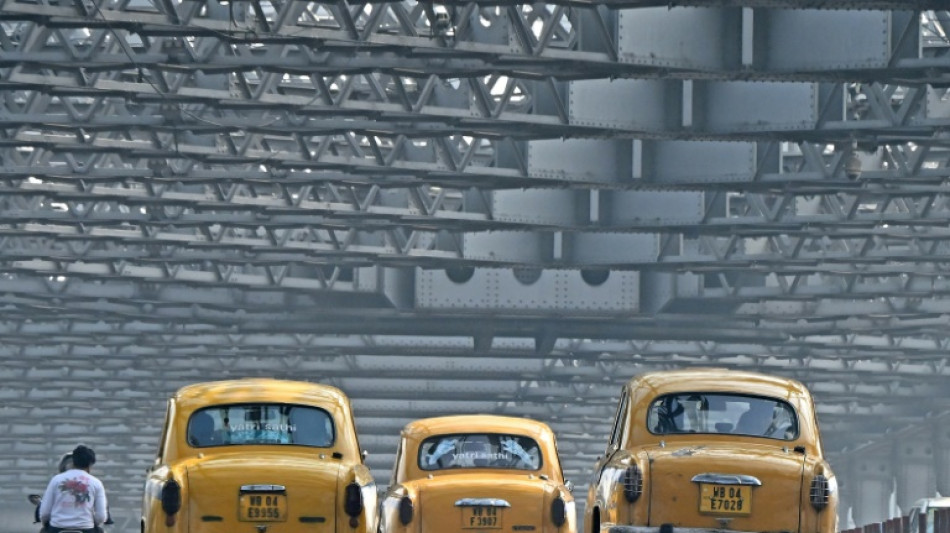
-
 Markets drop, gold hits record on Fed concern over Trump policies
Markets drop, gold hits record on Fed concern over Trump policies
-
Hamas hands over coffins, in transfer of Bibas family and elderly hostage bodies

-
 Airbus profit climbs in 2024, aims to accelerate output
Airbus profit climbs in 2024, aims to accelerate output
-
American conservatives gather to savor Trump's triumph

-
 Airbus proft climbs in 2024, aims to accelerate output
Airbus proft climbs in 2024, aims to accelerate output
-
Trump says trade deal with China 'possible'

-
 Singapore stays execution of Malaysian for second time
Singapore stays execution of Malaysian for second time
-
Hospitalised Pope had peaceful night, up and eating: Vatican

-
 China's sprawling rail projects around Asia
China's sprawling rail projects around Asia
-
Two trials, one president: South Korea's Yoon in the dock

-
 Northern Japan snowed under after two-week whiteout
Northern Japan snowed under after two-week whiteout
-
Mercedes-Benz profits plunge as German carmakers reel

-
 Hamas set to hand over bodies of four Israeli hostages
Hamas set to hand over bodies of four Israeli hostages
-
Two of a kind: Najin and Fatu, the last northern white rhinos

-
 Trump accuses Zelensky of treating US envoy 'rudely'
Trump accuses Zelensky of treating US envoy 'rudely'
-
'We will save them': The quest to rescue nearly extinct rhino

-
 Ousted South Korean president sought to stop 'dictatorship', says lawyer
Ousted South Korean president sought to stop 'dictatorship', says lawyer
-
Berlin film festival nurtures portraits of messy motherhood

-
 Renault revs up profitability in 2024
Renault revs up profitability in 2024
-
Zelensky to meet US envoy after Trump brands him a 'dictator'

-
 Japan's trade minister arranging US trip: reports
Japan's trade minister arranging US trip: reports
-
Eyeing China and US, EU hopes clean tech boost will spark growth

-
 Trump considering 'alternatives' to Boeing for Air Force One contract
Trump considering 'alternatives' to Boeing for Air Force One contract
-
'Never lost heart': Japan back-up keeper plays again after nine-year wait

-
 Ball, Bridges shine as Hornets sting Lakers
Ball, Bridges shine as Hornets sting Lakers
-
'Parasite' director says new film highlights strength of ordinary people

-
 Chinese workers from Myanmar scam centres heading home via Thailand
Chinese workers from Myanmar scam centres heading home via Thailand
-
Iran executed 975 people in 'horrifying' 2024 escalation: rights groups

-
 Sri Lanka train derailed after smashing into elephants
Sri Lanka train derailed after smashing into elephants
-
Afghanistan problem 'can be solved': former women's affairs minister

-
 G20 foreign ministers meet in South Africa without US on board
G20 foreign ministers meet in South Africa without US on board
-
Trump says Russia has 'the cards' in Ukraine talks

-
 Cambodian farmers risk lives for rice as US freezes demining aid
Cambodian farmers risk lives for rice as US freezes demining aid
-
Lights out for Indonesia civil servants as Prabowo cuts budgets

-
 London Fashion Week launches with ode to gender fluid designs
London Fashion Week launches with ode to gender fluid designs
-
Messi too hot for Sporting in sub-zero Champions Cup clash

-
 Asian markets drop as Fed flags concern over Trump policies
Asian markets drop as Fed flags concern over Trump policies
-
Myanmar returns first batch of Chinese scam workers to Thailand

-
 S. Korean president's lawyer says martial law bid sought to stop 'dictatorship'
S. Korean president's lawyer says martial law bid sought to stop 'dictatorship'
-
Heated immigration debate complicates Germany's search for workers

-
 Australia seeks to turn failing steel plant into 'green' hub
Australia seeks to turn failing steel plant into 'green' hub
-
Conservative Merz leads Germany's turbulent election race

-
 Hamas set to hand over Israel bodies of four Gaza hostages
Hamas set to hand over Israel bodies of four Gaza hostages
-
Fallen white-ball kings England in search of Champions Trophy revival

-
 Depleted Australia face uphill battle at Champions Trophy
Depleted Australia face uphill battle at Champions Trophy
-
Delta offers $30,000 each to Toronto plane crash passengers

-
 A flight to Oscars glory for Adrian Quesada and 'Like a Bird'?
A flight to Oscars glory for Adrian Quesada and 'Like a Bird'?
-
After rocky road, Havana's 'Cathedral of Ice Cream' back in from the cold

-
 Egypt unveils first ancient royal tomb since Tutankhamun
Egypt unveils first ancient royal tomb since Tutankhamun
-
US-Canadian relations on thin ice ahead of hockey rematch


End of the road for Kolkata's beloved yellow taxis
Kolkata locals cherish their city's past, which is why many in the one-time Indian capital are mourning a vanishing emblem of its faded grandeur: a hulking and noisy fleet of stately yellow taxis.
The snub-nosed Hindustan Ambassador, first rolling off the assembly line in the 1950s with a design that barely changed in the decades since, once ruled India's potholed streets.
Nowadays it is rarely spotted outside Kolkata, where it serves as the backbone of the metropolitan cab fleet and a readily recognisable symbol of the eastern city's identity.
But numbers are dwindling fast, and a court ruling means those that remain -- lumbering but still sturdy -- will be forced off the roads entirely in the next three years.
"I love my car like my son," Kailash Sahani, who has sat behind the wheel of an Ambassador cab for the past four decades, told AFP.
"It's a simple car -- no electronics, no frills," the 70-year-old added. "It's unbelievable how much things have changed... The end of these taxi cars also marks our end."
Sahani is among thousands of Kolkata cabbies relinquishing their vehicles in line with tough emissions standards introduced in 2009 to ease the city's endemic smog problem.
Only around 2,500 Ambassador taxis were still working at the start of this year, down from 7,000 a year earlier, according to Bengal Taxi Association figures.
Another 1,000 will be retired this year, and West Bengal state transport minister Snehasis Chakraborty told AFP that the remainder will be gone by the end of 2027.
"The car is strong. Parts and maintenance are cheap and if it breaks down, it's easy to find a mechanic," said Bengal Taxi Association spokesman Sanjeeb Roy.
Their disappearance, he added, "represents all that's wrong with India's changing economy".
- Litany of defects -
The Hindustan Ambassador was the cornerstone of India's automotive industry for decades from its 1957 debut at a factory on Kolkata's northern outskirts.
Modelled on a similarly regal sedan car from Britain's now long-defunct Morris Motors, the car was a triumphant achievement of industry in the first years of India's history as an independent nation.
A deluxe model, its windows adorned with lace curtains, was for years the main means of conveyance for government ministers and captains of industry.
But the car's shortcomings also served as a reminder of deep structural problems with the quasi-socialist economic system that prevailed in India at the time.
Buyers sat on wait lists for years because pervasive red tape stopped Hindustan Motors from raising production to meet demand, while a near-monopoly on sales left no incentive to maintain quality standards.
That gave rise to an oft-repeated joke about the litany of defects found in the average "Amby": the only thing in the car that doesn't make a sound is its horn.
Market reforms from the 1980s onwards saw the Ambassador muscled off Indian roads by more modern vehicles, and production was halted entirely in 2014 after years of flatlining demand.
- 'Get with the times' -
Kolkata, the headquarters of Hindustan Motors, is the last place where the cars are seen in any great number -- a reminder of the tethers binding the city to India's past.
Grand public buildings evoke the immense riches that flowed through the city's tree-lined boulevards back when it was the second-largest city in the British Empire, after London.
Nobel laureate poet and polymath Rabindranath Tagore was born and died in Kolkata, where the national anthem he composed was sung for the first time during India's long independence struggle.
The city is also renowned for its thrumming nightlife, with crowded and dimly lit restaurants serving up chicken Kiev alongside the same suite of old-world European staples that have been listed on their menus since the late colonial era.
But its importance has shrunk dramatically since that heyday, first with the relocation of India's capital to Delhi in 1911 and then with Mumbai's ascension as the country's most important commercial hub.
Many of Kolkata's younger generations have left in search of better opportunities elsewhere, giving it a median age at least six years older than other big Indian cities, according to census data.
The city's skewed demographics prompted its pre-eminent novelist Amit Chaudhuri to once quip that while Delhi was for seeking power and Mumbai was for chasing riches, Kolkata was for visiting one's parents.
"People like me are under pressure to get with the times," retired Kolkata schoolteacher Utpal Basu, 75, told AFP.
"Old cars go, new ones come," he added. "But it will break my heart when the city loses another icon."
E.Schubert--BTB
